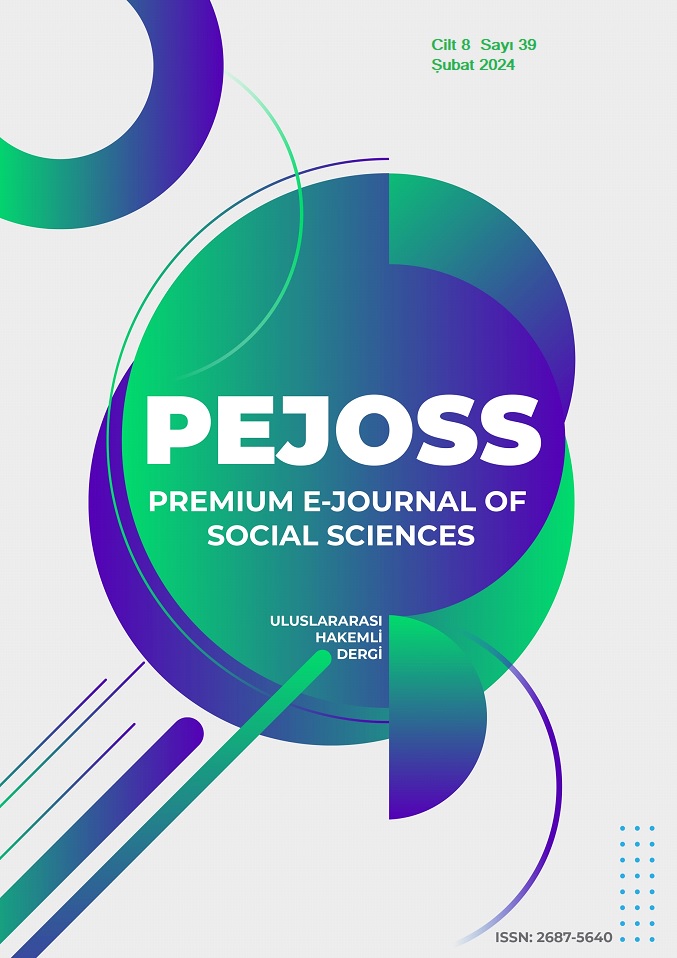The Relationship Between Teachers' Satisfaction Levels and Happiness Levels
DOI:
https://doi.org/10.5281/zenodo.10775608Keywords:
Teacher, Happiness, Satisfaction, LevelAbstract
Human beings have tried to define, understand, capture and experience happiness since their existence. It is known that the path to a happy life is through making the right decisions. The more correct the decision made, the higher the level of life satisfaction will be. Living standards that reach the satisfaction level will increase the level of happiness and even reach the maximum level. Decision making is the process of choosing one of the multiple paths and alternatives presented to an individual while advancing toward his goal. Complex situations make decision making very difficult. In order for the individual to make a healthy and correct decision, the entire cognitive process must function. In light of this information, the aim of this study was to examine the relationship between teachers' satisfaction levels and happiness levels. The population of this study in the survey model consists of a total of 250 teachers, 120 male and 130 female, working in public schools affiliated with the Ministry of National Education in the 2022-2023 academic year in Afyonkarahisar and Diyarbakır province. The data collected with the survey titled "Examination of the Relationship Between Teachers' Satisfaction Levels and Happiness Levels", consisting of 4 classification questions with 4 grades and a total of 6 questions and prepared with expert opinions; It was analyzed and interpreted by converting it into graphs containing frequency values and percentage values using Microsoft Office Excel and Microsoft Office World programs. As a result of this study, it has been determined that the happiness levels of people whose satisfaction level is at the highest level, that is, whose ego is satisfied, who have achieved the desired and carefree, serene life, are also at the highest level.
Downloads
References
Açıkgöz, M. (2016). Çukurova üniversitesi tıp fakültesi öğrencilerinin psikolojik sağlamlık ile mizah tarzları ve mutluluk düzeyi arasındaki ilişkinin incelenmesi. (Yüksek lisans tezi), Sosyal Bilimler Enstitüsü, Çağ Üniversitesi.
Arslan, H. (2019). Psikolojik Danışmanların Mutluluk, Psikolojik Sağlamlık ve Bağımlılık Durumları Arasındaki İlişkiler. Sağlık Bilimlerinde Eğitim Dergisi,1(1),17-35.
Arslan, M. (2007). “Eğitimde Yapılandırmacı Yaklaşımlar”, Ankara Üniversitesi Eğitim Bilimler Fakültesi Dergisi, 40(1),45-55.
Arslan, Y. (2018). Öğretmenlerin farklılıkların yönetimi yaklaşımlarına ilişkin algıları ile örgütsel mutluluk algıları arasındaki ilişki [Doktora Tezi]. Sosyal Bilimler Enstitüsü, Kocaeli Üniversitesi.
Bogaerts, S. (2013). Literature research on professional resilience among police officers. Commissioned by the Ministry of Justice and security, WODC, Scientific Department of External Relations. Tilburg University Developmental and Forensic Psychology https://english. wodc. nl/binaries/2229a-summary_tcm29-72606.pdf
Can, M. ve Cantez, K. E. (2018). Üniversite öğrencilerinin mutluluk, psikolojik sağlamlılık ve öz yeterlik düzeyleri arasındaki ilişki. Aydın Toplum ve İnsan Dergisi,4(2),61-76.
Çeliktepe, A., Akkaya, G., Yaman, M., İzgördü, F. A., Eşit, M., Güvenç, K., Tiryaki, B., & Bostan, F. (2024). Öğretmenlerin Karar Verme Stilleri ve Sosyal Beceri Düzeyleri ile Stresle Başa Çıkma Biçimlerinin İncelenmesi. Premium E-Journal of Social Science (PEJOSS), 8(38), 71–79.
Çetin, S. ve Polat, S. (2021). Ortaokul öğretmenlerinin örgütsel adalet algı düzeyleri ile örgütsel mutluluk düzeyleri arasındaki ilişki. Manas Sosyal Araştırmalar Dergisi, 10(1), 171-182.
DBE (2023). İş Doyumu. https://www.dbe.com.tr/tr/kurumsal/11/is-doyumu/
Diener, E. (1984). Subjective well-being. Psychological Buletin, 95(3), 542-575.
Doğan, T. ve Sapmaz, F. (2012). Mutluluk ve Yaşam Doyumunun Yordayıcısı Olarak İyimserlik. Mersin Üniversitesi Eğitim Fakültesi Dergisi, 8(3),63-69.
Eryılmaz, A. (2011). Investigating adolescents’ subjective well-being with respect to using subjective well-being increasing strategies and determining life goals. Düşünen Adam Psikiyatri ve Nörolojik Bilimler Dergisi,24(1),4451-4463. Doi:10.5350/Dajpn2011240106
Eryılmaz, A., ve Atak, H. (2011). Ergen öznel iyi olusunun özsaygı ve iyimserlik eğilimi ile ilişkisinin incelenmesi. Elektronik Sosyal Bilimler Dergisi, 10(37),170-181.
Freud, S.(1999). The Standard Edition of the Complete Psychological Works of Sigmund Freud. Vol. XIX James Strachey, Gen. Ed. 0-09-929622-5
Gleick, J. (1995). Kaos Yeni bir bilim teorisi. TÜBİTAK popüler bilim kitapları.
Güler, B. K., ve Emeç, H. (2006). Yaşam memnuniyeti ve akademik başarıda iyimserlik etkisi. Dokuz Eylül Üniversitesi İktisadı ve İdari Bilimler Fakültesi Dergisi, 21(2), 129-149.
İnayet, P. (2002). İş Yaşamında Stres, Pegem Yayınları.
Languages (2023). https://languages.oup.com/google-dictionary-tr/
Luthans, F., & Thomas, L. T. (1989). The relationship between age and job satisfaction: curvilinear results from an empirical study–a research note. Personnel Review, 18(1), 23-26.
Neugarten, B. L., Havighurst, R. J. ve Tobin, S. S. (1961). The measurement of life satisfaction. Journal of Gerontology, 16, 134-143.
Seligman, M. E. P. (2006). Learned optimism. How to change your mind and your life. Vintage Books.
Şaşmaz, Ş.C. (2016). Çocuğu Olan Evli Ve Evli Olmayan Bireylerin Psikolojik Sağlamlılık Ve Mutluluk Düzeylerinin İncelenmesi. [Yüksek lisans tezi]. Sosyal Bilimleri Enstitüsü, Beykent Üniversitesi.
Toprak, H. (2014). Ergenlerde Mutluluk ve Yaşam Doyumunun Yordayıcısı Olarak Psikolojik Sağlamlık ve Psikolojik İhtiyaç Doyumu. [Yüksek lisans tezi]. Eğitim Bilimleri Enstitüsü, Sakarya Üniversitesi.
Welford, M. (2013). The Power of Self-compassion: Using Compassion-focused Therapy to End Self-criticism and Build Selfconfidence. New Harbinger Publications.
Downloads
Published
How to Cite
Issue
Section
License
Copyright (c) 2024 Premium e-Journal of Social Science (PEJOSS)

This work is licensed under a Creative Commons Attribution 4.0 International License.


